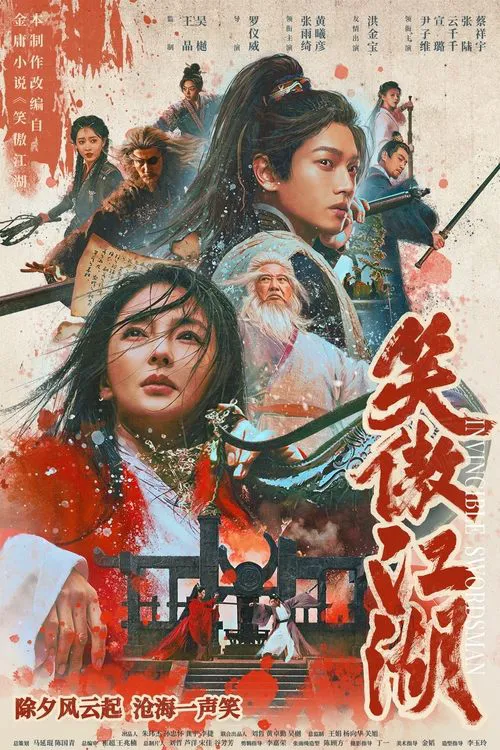Invincible Swordsman

Plot
In the realm of ancient China, the landscape was scarred by the eternal struggle between good and evil, and nowhere was this more evident than in the intricate and treacherous world of martial arts. Amidst this backdrop, a man named Linghu Chong stood out as a unique and extraordinary swordsman. Chong's greatest desire was to leave the world of martial arts behind, to shun the burdens and responsibilities that came with being a skilled practitioner of the art. He yearned for a simple, quiet life, free from the machinations of the various martial arts sects and schools. However, fate had other plans in store for Linghu Chong. As he journeyed through the countryside, his path inevitably led him into the midst of a conflict that would draw him back into the very world he sought to escape. This was largely due to the emergence of a formidable foe, Dongfang Bubai, the enigmatic leader of the Demonic Sect. Bubai was a name whispered in terror and awe by those who knew about him. His prowess on the battlefield was renowned, and his reputation as a ruthless leader made him a force to be reckoned with in the martial arts realm. As Chong navigated his journey, he found himself crossing paths with the enigmatic Bubai on more than one occasion. Each encounter left him both intrigued and unnerved. Despite the vast chasm that separated them - Chong being a devout follower of the righteous path, Bubai a master of the treacherous Demonic Sect - the two men seemed to have an undeniable affinity for each other. This was perhaps due to the complexity of Bubai's character, multifaceted and veiled in mystery. On the surface, he was a formidable warrior with no qualms about using underhanded tactics to achieve his goals, but beneath this façade lay a rich tapestry of emotions, desires, and vulnerabilities. As the unpredictable and tumultuous adventure drew to a close, Linghu Chong found himself bound to Bubai, drawn into a web of intrigue that left little room for escape. Their paths converged, and their destinies became intertwined in a dance of good and evil, where morality was but a thin line and the line between right and wrong grew increasingly blurred. Bubai, an individual of unparalleled skill, wielded a power that far surpassed that of his peers. His reputation, though feared, was matched only by the air of mystique surrounding him. Few people, if any, understood the driving forces behind his actions, and Chong, for one, could not quite grasp the enigma that was Bubai. Throughout the unfolding narrative, it becomes gradually clear that the relationship between Chong and Bubai is not merely a simple case of hero opposing villain. The bond between the two was far more intricate, a reflection of their respective desires and ambitions. Bubai, despite his malevolent intentions, seemed almost drawn to Chong's unyielding dedication to justice, a quality the latter possessed in abundance. Conversely, Chong's own morality was tested by his interactions with Bubai. Their complicated journey takes them to places both within and beyond the confines of the martial arts world. Along the way, Chong must confront his own demons - the weight of his past, his feelings of guilt, and his desire for a simpler existence. These introspections served as a backdrop to the unfolding conflict between good and evil. Through the trials and tribulations Chong faced, he came to understand the nature of his own convictions and how they shaped him. As he navigated the complex terrain, he learned to distinguish between the gray areas and the lines that truly separated right from wrong. This realisation allowed him to appreciate the enigmatic nature of Bubai, whose own motivations remained unclear until the very end. Though their paths would eventually part, the bond between Linghu Chong and Dongfang Bubai would leave a lasting impact on both men. For Chong, it marked a transformative experience, one that tested his resolve and broadened his perspective on the complex world of martial arts. And for Bubai, it presented an opportunity to confront the shadows of his own past, a chance to rediscover himself and challenge the very fabric of his being.
Reviews
Camille
I personally feel Li Yapeng brought out Linghu Chong's free-spirited nature.
Eden
I personally feel that Li Yapeng successfully captured Linghu Chong's unrestrained and devil-may-care spirit.
Riley
I find the artistic conception here far surpasses that of TVB dramas. I adore the bamboo forest setting and the music, especially the harmonious Qin and Xiao duet, evoking a sense of 'High Mountain and Flowing Water'. This truly embodies the Jianghu I've always envisioned.
August
Watched this when I was a kid, and honestly, I've never thought this adaptation was poorly made. The selection of scenery, the use of props, the soundtrack, and the casting are all quite good. Among all versions, this one has the best Ren Yingying, Yilin, and Yue Lingshan. And Li Yapeng wasn't that bad either; he had an aura and demeanor that were more fitting and vibrant than some of the other adaptations.
Recommendations




